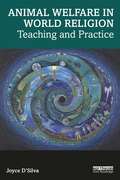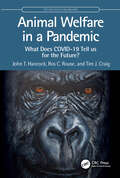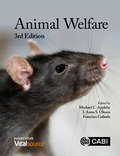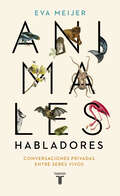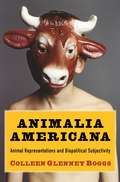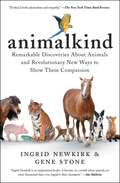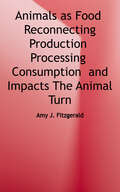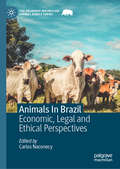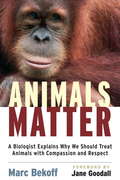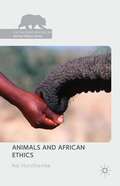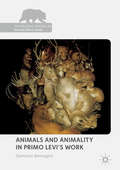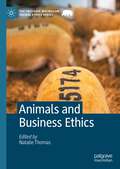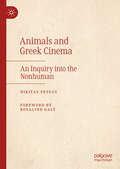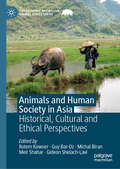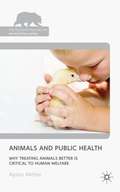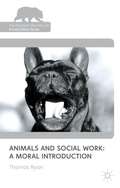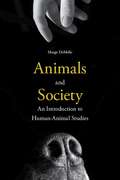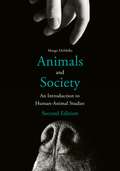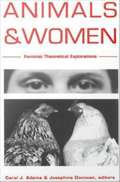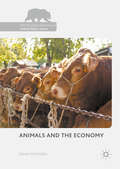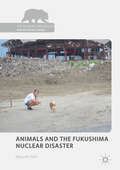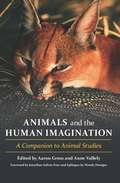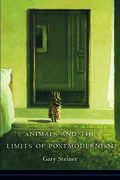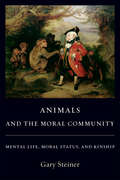- Table View
- List View
Animal Welfare in World Religion: Teaching and Practice
by Joyce D'SilvaThis unique and readable book examines the relationship between religion and animal welfare, taking a detailed dive into the teachings and practices of the major world religions. While there are many books expounding the beliefs of the major religions and many about the rights and welfare of animals, there are few linking the two. With each chapter focusing on one of the five major religions – Judaism, Christianity, Islam, Hinduism and Buddhism – the book explores the beliefs and practices which drive our relationship with and treatment of animals. The book draws on the scriptures of the major faiths and includes the voices of leading historical religious figures and contemporary faith leaders. In doing so, it compares the teachings of old with contemporary practices and showcases the impact of the major religions on both the protection and exploitation of animals, from running animal sanctuaries, to participating in or condoning cruel sports and factory farming. Importantly, the book also includes a chapter looking beyond the major world religions, where it examines a wider range of beliefs and practices, including Indigenous peoples from the USA and Australia, Jainism, Sikhism and Rastafarianism, to provide fascinating insights into another range of beliefs and views on the human-animal relationship. Overall, this book challenges and encourages religious leaders and followers to re-examine their teachings and to prioritise the well-being of animals. This book is essential reading for those interested in the role of religion in animal welfare, human-animal studies, and animal welfare and ethics more broadly.
Animal Welfare in a Pandemic: What Does COVID-19 Tell us for the Future? (CRC One Health One Welfare)
by John T. Hancock Ros C. Rouse Tim J. CraigAnimal Welfare in a Pandemic explores the impact of COVID-19 on a wide array of animals, from those in the wild to companion and captive animals. During the height of the pandemic, a range of animals were infected, and many died, but this was hard to predict, even using up-to-date bioinformatics. Lockdowns around the world had, and continue to have, a major effect on animals’ welfare, influencing pet ownership and care, as well as impacting on the work of conservation institutes due to the lack of visitors and funding and lack of tourist presence in the wild which impacted on anti-poaching efforts. Some of the vast amount of personal protection equipment (PPE) that was distributed was discarded, creating both dangers and occasional opportunities for wild animals. With the rollout of human vaccines, some countries started developing animal vaccines, only some of which were deployed. In summary, the pandemic had a wide-ranging influence on animal welfare around the world. This is reviewed to highlight what can be learned to protect and enhance animal welfare in future epidemics/pandemics, and contribute to a genuinely One Health approach where the health and welfare of both humans and animals are considered holistically.This book is authored by members of the University of the West of England, Bristol, who span a range of expertise in Biological Sciences, Social Sciences, Animal Welfare, and Ethics.
Animal Welfare, 3rd Edition
by Michael C. Appleby I. Anna S. OlssonUpdated and revised, this bestselling textbook continues to provide a broad introduction to the key topics in the welfare of animals both large and small, farm and companion, and wild and zoo. It retains all of the popular features of the previous editions and covers key issues such as ethics, animal pain and injury, health and disease, social conditions, and welfare dilemmas and problems. Importantly, it also offers practical advice for welfare assessment and a full section dedicated to the implementation of solutions. The third edition: - Contains many more examples of welfare issues in different countries, particularly the implications for smallholders as well as larger scale agriculture - Covers fish welfare as well as the welfare of amphibians, reptiles, and invertebrates - Includes concepts of positive emotion and other positive aspects of welfare - Focuses on animal welfare and sustainability - Includes an integrated ebook with additional material and videos With contributions from renowned international experts and a new editorial team, Animal Welfare 3E is an essential resource for students and researchers in animal and veterinary sciences and other disciplines considering the science and practice of animal welfare as well as for practitioners and decision-makers worldwide.
Animales habladores: Conversaciones privadas entre seres vivos
by Eva MeijerLos animales hablan. Claro que hablan. El problema es que no los escuchamos. «Un libro fascinante y accesible sobre cómose comunican los animales».The Guardian Los delfines y los loros se llaman entre sí por su nombre; los perros de las praderas describen a los intrusos con todo lujo de detalles - incluidos su tamaño, forma, velocidad y el color de su cabello o de sus camisetas-; a los murciélagos les encanta chismear; en los cantos de algunos pájaros y en los patrones de la piel de los calamares encontramos estructuras gramaticales... Con un poco de suerte, algún día se toparán con un animal que quiera hablar con ustedes, o incluso que se tome el tiempo y el esfuerzo de conocerlos. Si eso ocurre, comprobarán lo mucho que este tipo de relaciones nos enseñan sobre el lenguaje y sobre nosotros mismos. Cada vez son más los hallazgos científicos que demuestran que los animales tienen lenguajes ricos y complejos con reglas estructurales que les permiten diseñar estrategias, dar consejos, mostrarse amor e incluso cotillear. Animales habladores es una fascinante exploración filosófica (en compañía de autores como Aristóteles, Descartes, Wittgenstein y Heidegger) de las formas en que los animales se comunican entre sí y con nosotros, que revela su vida social secreta y sorprendente, cuestiona la jerarquía entre los humanos y el resto de criaturas y propone una nueva forma de entender el lenguaje. La crítica ha dicho:«Un puñado de historias fascinantes y mucho que aprender de ellas... Meijer demuestra que muchos animales son más sofisticados y más inteligentes de lo que creemos».The Spectator «Eva Meijer se ha propuesto redefinir la relación entre humanos y animales. Una visión audaz y progresista de un futuro más justo en el que la humanidad mejora al compartir la Tierra simplemente aprendiendo a escuchar».The Herald Tribune «Fascinante».Daily Mail «Rebosante de anécdotas fabulosamente entretenidas».Strong Words
Animalia Americana: Animal Representations and Biopolitical Subjectivity (Critical Perspectives on Animals: Theory, Culture, Science, and Law)
by Colleen BoggsColleen Glenney Boggs puts animal representation at the center of the making of the liberal American subject. Concentrating on the formative and disruptive presence of animals in the writings of Frederick Douglass, Edgar Allan Poe, and Emily Dickinson, Boggs argues that animals are critical to the ways in which Americans enact their humanity and regulate subjects in the biopolitical state. <P><P>Biopower, or a politics that extends its reach to life, thrives on the strategic ambivalence between who is considered human and what is judged as animal. It generates a space of indeterminacy in which animal representations intervene to define and challenge the parameters of subjectivity. The renegotiation of the species line produces a tension that is never fully regulated. Therefore, as both figures of radical alterity and the embodiment of biopolitics, animals are simultaneously exceptional and exemplary to the biopolitical state. An original contribution to animal studies, American studies, critical race theory, and posthumanist inquiry, Boggs thrillingly reinterprets a long and highly contentious human-animal history.
Animalkind: Remarkable Discoveries About Animals and Revolutionary New Ways to Show Them Compassion
by Gene Stone Ingrid NewkirkThe founder and president of PETA, Ingrid Newkirk, and bestselling author Gene Stone explore the wonders of animal life and offer tools for living more kindly toward them.In the last few decades, a wealth of new information has emerged about who animals are—intelligent, aware, and empathetic. Studies show that animals are astounding beings with intelligence, emotions, intricate communications networks, and myriad abilities. In Animalkind, Ingrid Newkirk and Gene Stone present these findings in a concise and awe-inspiring way, detailing a range of surprising discoveries: that geese fall in love and stay with a partner for life, that fish &“sing&” underwater, and that elephants use their trunks to send subsonic signals, alerting other herds to danger miles away. Newkirk and Stone pair their tour of the astounding lives of animals with a guide to the exciting new tools that allow humans to avoid using or abusing animals as we once did. They show readers what they can do in their everyday lives to ensure that the animal world is protected from needless harm. Whether it&’s medicine, product testing, entertainment, clothing, or food, there are now better options to all the uses animals once served in human life. We can substitute warmer, lighter faux fleece for wool, choose vegan versions of everything from shrimp to sausage and milk to marshmallows, reap the benefits of medical research that no longer requires monkeys to be caged in laboratories, and scrap captive orca exhibits and elephant rides for virtual reality and animatronics. Animalkind is a fascinating study of why our fellow living beings deserve our respect, and moreover, the steps every reader can take to put this new understanding into action.
Animals As Food: (Re)connecting Production, Processing, Consumption, and Impacts
by Amy J. FitzgeraldEvery day, millions of people around the world sit down to a meal that includes meat. This book explores several questions as it examines the use of animals as food: How did the domestication and production of livestock animals emerge and why? How did current modes of raising and slaughtering animals for human consumption develop, and what are their consequences? What can be done to mitigate and even reverse the impacts of animal production? With insight into the historical, cultural, political, legal, and economic processes that shape our use of animals as food, Fitzgerald provides a holistic picture and explicates the connections in the supply chain that are obscured in the current mode of food production. Bridging the distance in animal agriculture between production, processing, consumption, and their associated impacts, this analysis envisions ways of redressing the negative effects of the use of animals as food. It details how consumption levels and practices have changed as the relationship between production, processing, and consumption has shifted. Due to the wide-ranging questions addressed in this book, the author draws on many fields of inquiry, including sociology, (critical) animal studies, history, economics, law, political science, anthropology, criminology, environmental science, geography, philosophy, and animal science.
Animals In Brazil: Economic, Legal and Ethical Perspectives (The Palgrave Macmillan Animal Ethics Series)
by Carlos NaconecyThis book presents a collection of essays exploring the legal, economic, socio-environmental, and ethical dimensions of human-animal interaction in Brazil. As one of the primary global producers and exporters of beef, with a level of biodiversity in its rain-forests found nowhere else under threat, the importance of Brazil for animal life is unquestionable. Shedding light on the profound transformations in the consumption and production of animal-sourced foods that have taken place over the last five decades, the authors examine the consequences of this phenomenon for the lives of animals, the health of the population, and the environment. The book also offers an analysis of the animal welfare and animal protection legislation in Brazil, before presenting a number of notable cases involving animal advocacy and activism in recent years. An important and timely collection, this book concludes with an exploration of the historical, socio-cultural and economic aspects that influence the Brazilian ethos regarding the morality of the treatment of animals.
Animals Matter: A Biologist Explains Why We Should Treat Animals with Compassion and Respect
by Marc Bekoff Jane GoodallNonhuman animals have many of the same feelings we do. They get hurt, they suffer, they are happy, and they take care of each other. Marc Bekoff, a renowned biologist specializing in animal minds and emotions, guides readers from high school age up--including older adults who want a basic introduction to the topic--in looking at scientific research, philosophical ideas, and humane values that argue for the ethical and compassionate treatment of animals. Citing the latest scientific studies and tackling controversies with conviction, he zeroes in on the important questions, inviting reader participation with "thought experiments" and ideas for action. Among the questions considered: * Are some species more valuable or more important than others? * Do some animals feel pain and suffering and not others? * Do animals feel emotions? * Should endangered animals be reintroduced to places where they originally lived? * Should animals be kept in captivity? * Are there alternatives to using animals for food, clothing, cosmetic testing, and dissection in the science classroom? * What can we learn by imagining what it feels like to be a dog or a cat or a mouse or an ant? * What can we do to make a difference in animals' quality of life?Bekoff urges us not only to understand and protect animals--especially those whose help we want for our research and other human needs--but to love and respect them as our fellow beings on this planet that we all want to share in peace.
Animals and African Ethics
by Kai HorsthemkeAfrican ethics is primarily concerned with community and harmonious communal relationships. The claim is frequently made on behalf of African moral beliefs and customs that African society does not objectify and exploit nature and natural existents, unlike Western moral attitudes and practices. This book investigates whether this claim is correct by examining religious and philosophical thought, as well as traditional cultural practices in Africa. Through exploration of what kind of status is reserved for other-than-human animals in African ethics, Horsthemke argues that moral perceptions and attitudes on the African continent remain resolutely anthropocentric, or human-centred. Although values like ubuntu (humanness) and ukama (relationality) have been expanded to include nonhuman nature, animals have no rights, and human duties to them are almost exclusively 'indirect'. Animals and African Ethics concludes by asking whether those who, following their own liberation, continue to exploit and oppress other creatures, are not thereby contributing to their own dehumanization.
Animals and Animality in Primo Levi’s Work (The Palgrave Macmillan Animal Ethics Series)
by Damiano BenvegnùSituated at the intersection of animal studies and literary theory, this book explores the remarkable and subtly pervasive web of animal imagery, metaphors, and concepts in the work of the Jewish-Italian writer, chemist, and Holocaust survivor Primo Levi (1919-1987). Relatively unexamined by scholars, the complex and extensive animal imagery Levi employed in his literary works offers new insights into the aesthetical and ethical function of testimony, as well as an original perspective on contemporary debates surrounding human-animal relationships and posthumanism. The three main sections that compose the book mirror Levi’s approach to non-human animals and animality: from an unquestionable bio-ethical origin (“Suffering”); through an investigation of the relationships between writing, technology, and animality (“Techne”); to a creative intellectual project in which literary animals both counterbalance the inevitable suffering of all creatures, and suggest a transformative image of interspecific community (“Creation”).
Animals and Business Ethics (The Palgrave Macmillan Animal Ethics Series)
by Natalie ThomasThis book engages with some of the most pressing ethical issues that arise from the use of animals in various business practices, providing interdisciplinary approaches to improving the nonhuman and human lives in animal-related industries. The chapters in this volume provide conceptual, theoretical and practical analyses of these issues that will shape the future direction of business ethics to more fully refl ect the impacts and implications of animal-based businesses on society, its members, and nature. The authors in this volume engage with topics including animal suffering and emotions, the commodifi cation of animals, vegetarian and vegan businesses and diets, technological innovations such as gene editing and lab-cultured meat, as well as captivity, corporate disclosure of animal welfare policies, and the possibility of humane jobs as well as the consideration of animals as stakeholders.
Animals and Greek Cinema: An Inquiry into the Nonhuman
by Nikitas FessasThis book offers a non-anthropocentric account of a national cinema. Drawing on cutting-edge developments in Animal (film) studies, the book gathers a wide range of species and genres to discuss the Greek cinematic animal. This en-tails recalibrating the readers&’/viewers&’ gazes to include particular nonhumans, often displaced in the frame&’s margins. While acknowledging the cost paid in animal suffering for Greek cinema to rise, the book features instances of animal-human bonding. Combining close readings with interviews with directors, human actors, screenwriters, cinematographers, producers, special effects artists, and animal wranglers, this book proposes a paradigm of human-animal praxis, arguing that revisiting nonhuman images can lead to renewed ethical relations, and to less speciesist cinemas, film industries, and societies.
Animals and Human Society in Asia: Historical, Cultural and Ethical Perspectives (The Palgrave Macmillan Animal Ethics Series)
by Rotem Kowner Michal Biran Gideon Shelach-Lavi Meir Shahar Guy Bar-OzThis edited collection offers a comprehensive overview of the different aspects of human-animal interactions in Asia throughout history. With twelve thematically-arranged chapters, this book examines the diverse roles that beasts, livestock, and fish — real and metaphorical– have played in Asian history, society, and culture. Ranging from prehistory to the present day, the authors address a wealth of topics including the domestication of animals, dietary practices and sacrifice, hunting, the use of animals in war, and the representation of animals in literature and art. Providing a unique perspective on human interaction with the environment, the volume is cross-disciplinary in its reach, offering enriching insights to the fields of animal ethics, Asian studies, world history and more.
Animals and Public Health
by Aysha AkhtarA compelling argument of how human health is adversely affected by our poor treatment of non-human animals. The author contents that in order to successfully confront the 21st Century's health challenges, we need to broaden the definition of the word 'public' in public health to include non-human animals.
Animals and Social Work: A Moral Introduction
by Thomas RyanSocial Work and Animals represents a pioneering contribution to the literature of social work ethics and moral philosophy. It advances cogent and detailed arguments for the inclusion of animals within social work's moral framework, arguments that have profound theoretical and practical implications for the discipline and its practitioners.
Animals and Society: An Introduction to Human-Animal Studies
by Margo DeMelloConsidering that much of human society is structured through its interaction with non-human animals, and since human society relies heavily on the exploitation of animals to serve human needs, human–animal studies has become a rapidly expanding field of research, featuring a number of distinct positions, perspectives, and theories that require nuanced explanation and contextualization. <P><P>The first book to provide a full overview of human–animal studies, this volume focuses on the conceptual construction of animals in American culture and the way in which it reinforces and perpetuates hierarchical human relationships rooted in racism, sexism, and class privilege. Margo DeMello considers interactions between humans and animals within the family, the law, the religious and political system, and other major social institutions, and she unpacks the different identities humans fashion for themselves and for others through animals. Essays also cover speciesism and evolutionary continuities; the role and preservation of animals in the wild; the debate over zoos and the use of animals in sports; domestication; agricultural practices such as factory farming; vivisection; animal cruelty; animal activism; the representation of animals in literature and film; and animal ethics. Sidebars highlight contemporary controversies and issues, with recommendations for additional reading, educational films, and related websites. DeMello concludes with an analysis of major philosophical positions on human social policy and the future of human–animal relations.
Animals and Society: An Introduction to Human-Animal Studies
by Margo DeMelloHuman-animal studies is an interdisciplinary field that explores the spaces that animals occupy in human social and cultural worlds. It examines the interactions humans and animals have with each other and the ways animal lives intersect with human societies. Since existing social orders rely on the exploitation of animals to serve human needs, the questions posed by human-animal studies touch upon a wide range of fundamental issues.Animals and Society provides a broad overview of this rapidly growing field. Margo DeMello offers students and scholars a holistic and comprehensive picture of the state of inquiry into the relationships that exist between humans and other animals. She considers interactions between animals and humans in social organizations, such as the family, the legal system, and political and religious institutions. A major focus is the social construction of animals in world cultures and the way in which these social meanings are used to reinforce and perpetuate hierarchical human relationships such as racism, sexism, and class privilege. The book also examines how different human groups construct a range of identities for themselves and for others through animals.This second edition of Animals and Society is fully updated and expanded throughout, enhancing the book’s relevance for student and activist readers alike. It includes many new international examples, all-new case studies, and updated supplementary readings.
Animals and Women: Feminist Theoretical Explorations
by Carol J. Adams Josephine DonovanAnimals and Women is a collection of pioneering essays that explores the theoretical connections between feminism and animal defense. Offering a feminist perspective on the status of animals, this unique volume argues persuasively that both the social construction and oppressions of women are inextricably connected to the ways in which we comprehend and abuse other species. Furthermore, it demonstrates that such a focus does not distract from the struggle for women's rights, but rather contributes to it. This wide-ranging multidisciplinary anthology presents original material from scholars in a variety of fields, as well as a rare, early article by Virginia Woolf. Exploring the leading edge of the species/gender boundary, it addresses such issues as the relationship between abortion rights and animal rights, the connection between woman-battering and animal abuse, and the speciesist basis for much sexist language. Also considered are the ways in which animals have been regarded by science, literature, and the environmentalist movement. A striking meditation on women and wolves is presented, as is an examination of sexual harassment and the taxonomy of hunters and hunting. Finally, this compelling collection suggests that the subordination and degradation of women is a prototype for other forms of abuse, and that to deny this connection is to participate in the continued mistreatment of animals and women.
Animals and the Economy (The Palgrave Macmillan Animal Ethics Series)
by Steven McMullenThis book explores the economic institutions that determine the nature of animal lives as systematically exploited objects traded in a market economy. It examines human roles and choice in the system, including the economic logic of agriculture, experimentation, and animal ownership, and analyses the marginalization of ethical action in the economic system. Animals and the Economy demonstrates that individual consumers and farmers are often left with few truly animal-friendly choices. Ethical participants in the economy must either face down an array of institutional barriers, or exit mainstream markets entirely. This book argues that these issues are not necessary elements of a market system, and evaluates a number of policy changes that could improve the lives of animals in the context of a market economy.
Animals and the Fukushima Nuclear Disaster (The Palgrave Macmillan Animal Ethics)
by Mayumi ItohThis book is the first comprehensive, in-depth English language study of the animals that were left behind in the exclusion zone in the wake of the nuclear meltdown of three of the four reactors at the Fukushima Daiichi Nuclear Power Station in March 2011, triggered by the Great East Japan Earthquake of magnitude 9.0. <P><P>The Japanese government designated an area of 20-kilometer radius from the nuclear power station as an exclusion zone and evacuated one hundred thousand residents, but left companion animals and livestock animals behind in the radioactive area. Consequently, about 90 percent of the animals in the exclusion zone died. This book juxtaposes policies of the Japanese government toward the animals in Fukushima with the actions of grassroots volunteer animal rescue groups that filled the void of the government.
Animals and the Human Imagination: A Companion to Animal Studies
by Wendy DonigerHuman beings have long imagined their subjectivity, ethics, and ancestry with and through animals, yet not until the mid-twentieth century did contemporary thought reflect critically on animals' significance in human self-conception. Thinkers such as French philosopher Jacques Derrida, South African novelist J. M. Coetzee, and American theorist Donna Haraway have initiated rigorous inquiries into the question of the animal, now blossoming in a number of directions. It is no longer strange to say that if animals did not exist, we would have to invent them.This interdisciplinary and cross-cultural collection reflects the growth of animal studies as an independent field and the rise of "animality" as a critical lens through which to analyze society and culture, on a par with race and gender. <P><P>Essays consider the role of animals in the human imagination and the imagination of the human; the worldviews of indigenous peoples; animal-human mythology in early modern China; and political uses of the animal in postcolonial India. They engage with the theoretical underpinnings of the animal protection movement, representations of animals in children's literature, depictions of animals in contemporary art, and the philosophical positioning of the animal from Aristotle to Derrida. The strength of this companion lies in its timeliness and contextual diversity, which makes it essential reading for students and researchers while further developing the parameters of the discipline.
Animals and the Limits of Postmodernism
by Gary SteinerWhile postmodern approaches to politics and ethics have offered some intriguing and influential insights in philosophy and theory, Gary Steiner illuminates the fundamental inability of these approaches to arrive at viable ethical and political principles. Ethics require notions of self, agency, and value that are not available to postmodernists. Therefore much of what is published under the rubric of theory lacks a proper basis for a systematic engagement with ethics. Steiner provocatively critiques postmodernist approaches to the moral status of animals against the background of a broader indictment of postmodern thought and its inability to establish clear principles for action. He revisits the work of Derrida, Foucault, Nietzsche, and Heidegger, together with recent work by their American interpreters, and shows that the basic terms of postmodern thought are incompatible with any definitive claims about the moral status or rights of animals -- and humans. Steiner acknowledges the failures of liberal humanist thought regarding the moral status of animals; but instead of following postmodern thinkers who reject humanist thought outright, he argues for the need to rethink humanist notions in a way that avoids the anthropocentric limitations of traditional humanist thought. Drawing on the achievements of the Stoics and Kant, Steiner builds on his earlier work, developing his ideas of cosmic holism and non-anthropocentric cosmopolitanism in order to arrive at a more concrete foundation for animal rights.
Animals and the Limits of Postmodernism (Critical Perspectives on Animals: Theory, Culture, Science, and Law)
by Gary SteinerIn Animals and the Limits of Postmodernism, Gary Steiner illuminates postmodernism's inability to produce viable ethical and political principles. Ethics requires notions of self, agency, and value that are not available to postmodernists. Thus, much of what is published under the rubric of postmodernist theory lacks a proper basis for a systematic engagement with ethics. Steiner demonstrates this through a provocative critique of postmodernist approaches to the moral status of animals, set against the background of a broader indictment of postmodernism's failure to establish clear principles for action. He revisits the ideas of Derrida, Foucault, Nietzsche, and Heidegger, together with recent work by their American interpreters, and shows that the basic terms of postmodern thought are incompatible with definitive claims about the moral status of animals—as well as humans. Steiner also identifies the failures of liberal humanist thought in regards to this same moral dilemma, and he encourages a rethinking of humanist ideas in a way that avoids the anthropocentric limitations of traditional humanist thought. Drawing on the achievements of the Stoics and Kant, he builds on his earlier ideas of cosmic holism and non-anthropocentric cosmopolitanism to arrive at a more concrete foundation for animal rights.
Animals and the Moral Community: Mental Life, Moral Status, and Kinship
by Gary SteinerGary Steiner argues that ethologists and philosophers in the analytic and continental traditions have largely failed to advance an adequate explanation of animal behavior. Critically engaging the positions of Marc Hauser, Daniel Dennett, Donald Davidson, John Searle, Martin Heidegger, and Hans-Georg Gadamer, among others, Steiner shows how the Western philosophical tradition has forced animals into human experiential categories in order to make sense of their cognitive abilities and moral status and how desperately we need a new approach to animal rights. <P><P>Steiner rejects the traditional assumption that a lack of formal rationality confers an inferior moral status on animals vis-à-vis human beings. Instead, he offers an associationist view of animal cognition in which animals grasp and adapt to their environments without employing concepts or intentionality. Steiner challenges the standard assumption of liberal individualism according to which humans have no obligations of justice toward animals. Instead, he advocates a "cosmic holism" that attributes a moral status to animals equivalent to that of people. Arguing for a relationship of justice between humans and nature, Steiner emphasizes our kinship with animals and the fundamental moral obligations entailed by this kinship.
